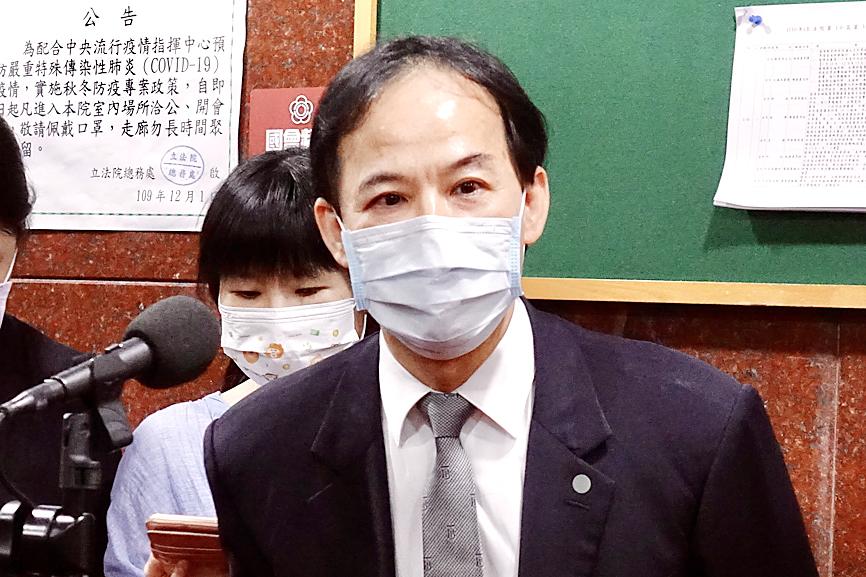The Financial Supervisory Commission (FSC) is to tighten its review of listed companies’ capital reduction plans after dozens of firms announced reductions in the first quarter, the commission said yesterday.
The commission requires certified public accountants to justify the necessity of a capital reduction and its effects on a company’s financial structure if it plans to cut capital by more than 50 percent.
Given a rise in the number of local companies that have applied to reduce capital, the commission has asked the Securities and Futures Investors Protection Center to help review the plans on a case-by-case basis, Securities and Futures Bureau Director-General Sam Chang (張振山) told a meeting of the legislature’s Finance Committee in Taipei yesterday.

Photo: Tu Chien-jung, Taipei Times
The FSC expects to announce the results of its review in two weeks, Chang said.
The change comes after Chinese Nationalist Party (KMT) Legislator Alex Fai (費鴻泰) asked the commission whether it was suspicious that more companies announced capital reductions in the first quarter.
Eighteen listed firms announced capital reductions totaling NT$57.48 billion (US$1.98 billion) as of the end of last month, nearly as high as for the whole of 2018, Fai said.
Unlike companies’ previous capital reductions, which mostly correlated with rising share prices, the announcements in the first quarter constrained share prices, as in most cases the companies’ share prices fell the next day, Fai added.
Rumors had circulated that some companies aimed to reduce capital to dilute stakes held by minor shareholders, a move that would help certain players gain boardroom control, he said.
Such moves could be possible, and the commission would keep a lookout for this behavior in its review, Chang said.
A capital reduction is just one tool that companies can use to adjust their capital structure, and does not necessarily mean anything more, Chang said, adding that whether such an announcement results in a company’s share price rising or falling depends on how investors interpret the move.
The commission bars companies from conducting capital injections for one year following a capital reduction, Chang said.
Some lawmakers had recommended that the FSC should lengthen the period to three years, but it might be inappropriate as corporate management requires flexibility, Chang said.

Taiwan will prioritize the development of silicon photonics by taking advantage of its strength in the semiconductor industry to build another shield to protect the local economy, National Development Council (NDC) Minister Paul Liu (劉鏡清) said yesterday. Speaking at a meeting of the legislature’s Economics Committee, Liu said Taiwan already has the artificial intelligence (AI) industry as a shield, after the semiconductor industry, to safeguard the country, and is looking at new unique fields to build more economic shields. While Taiwan will further strengthen its existing shields, over the longer term, the country is determined to focus on such potential segments as

UNCERTAINTY: Innolux activated a stringent supply chain management mechanism, as it did during the COVID-19 pandemic, to ensure optimal inventory levels for customers Flat-panel display makers AUO Corp (友達) and Innolux Corp (群創) yesterday said that about 12 to 20 percent of their display business is at risk of potential US tariffs and that they would relocate production or shipment destinations to mitigate the levies’ effects. US tariffs would have a direct impact of US$200 million on AUO’s revenue, company chairman Paul Peng (彭雙浪) told reporters on the sidelines of the Touch Taiwan trade show in Taipei yesterday. That would make up about 12 percent of the company’s overall revenue. To cope with the tariff uncertainty, AUO plans to allocate its production to manufacturing facilities in

COLLABORATION: Given Taiwan’s key position in global supply chains, the US firm is discussing strategies with local partners and clients to deal with global uncertainties Advanced Micro Devices Inc (AMD) yesterday said it is meeting with local ecosystem partners, including Taiwan Semiconductor Manufacturing Co (TSMC, 台積電), to discuss strategies, including long-term manufacturing, to navigate uncertainties such as US tariffs, as Taiwan occupies an important position in global supply chains. AMD chief executive officer Lisa Su (蘇姿丰) told reporters that Taiwan is an important part of the chip designer’s ecosystem and she is discussing with partners and customers in Taiwan to forge strong collaborations on different areas during this critical period. AMD has just become the first artificial-intelligence (AI) server chip customer of TSMC to utilize its advanced

Chizuko Kimura has become the first female sushi chef in the world to win a Michelin star, fulfilling a promise she made to her dying husband to continue his legacy. The 54-year-old Japanese chef regained the Michelin star her late husband, Shunei Kimura, won three years ago for their Sushi Shunei restaurant in Paris. For Shunei Kimura, the star was a dream come true. However, the joy was short-lived. He died from cancer just three months later in June 2022. He was 65. The following year, the restaurant in the heart of Montmartre lost its star rating. Chizuko Kimura insisted that the new star is still down